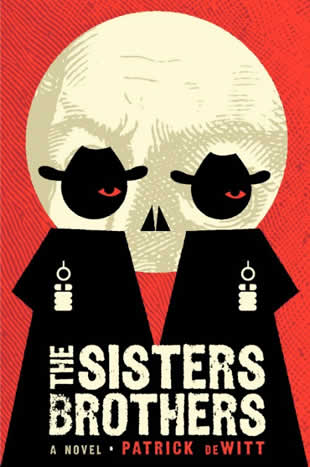 Reading the Longlist
Reading the Longlist
Wandering the
Sideshow, Guns at
the Ready
The Sisters Brothers
by Patrick deWitt
Review by Dan DeWeese
By now you’ve probably heard about The Sisters Brothers, Patrick deWitt’s western picaresque. It has been nominated for a number of awards in multiple countries; the Ecco hardback’s cover art, by Dan Stiles, is clever, daring, and unforgettable; and the book’s promotional materials assure readers that the film rights have already been optioned by John C. Reilly. That’s a lot of promise and production value, which means that by this point, any reader picking up The Sisters Brothers is probably at some level wondering whether a single book can live up to this degree of pre-sale prestige.
The answer is yes. The tale of Charlie and Eli Sisters—hired killers with a reputation that precedes them—and their journey from Oregon City to Sacramento in 1851 to kill a man named Hermann Kermit Warm touches so many notes, so skillfully, that just a few pages of deWitt’s prose silences not only any preconceptions, but renders the world that gave rise to those preconceptions—the book business, awards season, etc.—just a faint buzz somewhere far in the background as you instead give yourself over to the world of the novel. We are in the melancholic company of Eli Sisters from the tale's very first words, as he glances sidelong at an inferior horse he has been given, and then learns that his employer, “The Commodore,” has suggested that brother Charlie operate as lead man on their next job and Eli take a smaller share of the pay. The brothers’ relationship is fractious from the opening pages, but in a way that also signals deep familiarity and fidelity, and their interplay, primarily rendered via deWitt’s formidable skill with dialogue, provides the novel with a propulsive energy. One senses that a longstanding and robust sibling rivalry has now been formalized into a work relationship, and that Eli’s response to this situation, which he considers as the novel proceeds, could land anywhere on a continuum from an apathetic shrug to murderous violence.
DeWitt takes full advantage of the opportunities a picaresque offers: there are wild and wily characters, episodes that become their own mini-stories, and always the opportunity for the brothers to move on down the road before they, or the narrative, become too deeply enmeshed in local situations. Other readers have raised Charles Portis’s name as a reference, and the comparison is apt, insofar as deWitt puts a cockeyed spin on the narrative by seeding it with eccentrics and outcasts and then allowing them to talk and hatch plans. Though the Sisters brothers are comfortable pulling the trigger with great skill and little compunction, this is a tale that takes place not in the gunfighting "Old West" of violent stoics, but rather in that other old west, the land of traveling sideshows, lost and wandering babblers, and prospectors gone batty with their lust for dust. DeWitt maintains command not only of this diverse material, but of the reader’s assumptions, as well. Every time you think the narrative has settled into being a Coen brothers movie, an allegory of the culture industry, the Fight Club trick, or just an update of Butch and Sundance, deWitt is ahead of you, and the story shifts registers—but via natural progressions that reveal, more than anything, the impoverished palette of your own assumptions. Period detail isn't employed as mere scene painting here, but is instead woven into the lives of the characters (dental hygiene figures more than once), and deWitt doesn’t defy genre conventions so much as he just respects his madmen and dreamers enough to let the story follow them where they want to go, even if it means instead of shootouts in a corral we find ourselves in a spiked stream that glows in the night while delivering chemical burns to those who wade in. This is bold, funny, inventive stuff, relayed in the companionable voice of a killer reflective enough that you worry for his safety—reflection not being a quality that keeps one quick on the draw. DeWitt has crafted something here that is like the literary equivalent of a song with a theremin in it: one first feels that the exotic oscillation renders things immediately and irretrievably dark or otherwordly, but the fact is that in skilled hands, the theremin can also deliver “Good Vibrations.” It's rare and difficult, but some compositions bounce, delight, and disquiet in equal measure. The Sisters Brothers is one of them. Ω
Dan DeWeese is the Editor-in-Chief of Propeller. His novel, You Don't Love This Man (Harper Perennial), came out earlier this year.


